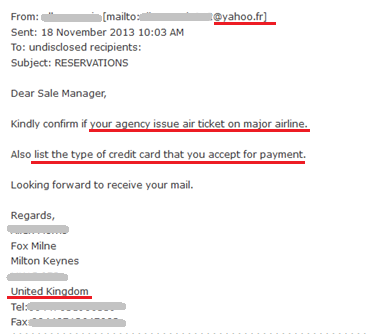
Credit card fraud is one of the biggest threats facing both big and small online businesses. This is an even bigger issue for the travel industry due to the nature of the products being sold. At FlightSiteAgent we aim to assist in all aspects of running your travel business by providing valuable and relevant information. Whilst credit card fraud can take many shapes and forms, there are a few key factors that could help you identify a fraudulent transaction and ways to avoid participating in such a transaction.
Identify Fraudulent Travellers & Agents
Online fraud has come a long way in the last twenty years. Gone are the days of Nigerian princes, today’s fraudsters are experienced, proficient in English and have learnt from past mistakes. In short: they are better and harder to spot, but usually not good enough to avoid detection by the keen eye.
Fraudulent travellers will usually use email as their first, and possibly only, method of communication. This is one of the biggest advantages we have, as it gives us time to evaluate every aspect of their communication and how they present themselves.
Approach enquiries from new clients with suspicion, especially ones asking about accepted credit cards or which airlines you can issue first. Whilst in itself harmless, this isn’t usually a traveller’s first concern. It is only natural for a traveller to request a quote first and follow up with payment queries once they’ve decided to continue with the booking.
Next up, it is worth taking a closer look at all the details provided in the email and not only the information typed by the client. Compare the hosting country of the email address, the language used, any addresses provided and the departure city of flights requested. In many cases some or all of the above information won’t match.
See the example below, where the email address is hosted in France, the language is English, the address provided is in England and the eventual departure city was Cairo. This definitely warrants further investigation and caution if you decide to continue with the booking.

Besides the country denoted by the use of .uk (United Kingdom), .fr (France), .it (Italy), .au (Australia) instead of .com in the email address, you can also tell a lot from the company used to host their email. Few legitimate companies will use a generic ‘@yahoo.com’ or ‘@gmail.com’ email address when they have access to personalised email hosting.
Over 90% of the fraudulent bookings we receive are for departure or arrival in Africa and often for travel in Africa. While this is completely innocent when considered in isolation, when paired with any of the other fraud indicators we advise you continue with caution.
Lastly we’d advise against making last-minute bookings, especially for new clients, without sufficient reason being provided by the client. Fraudulent travellers like doing this to reduce the risk of being caught before they are able to travel on the ticket. Other travellers usually have a very good reason for making a last minute booking, as it is inconvenient and costly.
Making a booking last-minute also allows the fraudster to pressure you into doing away with lengthy fraud checks. They’ll often make out their booking as being urgent and pressure you into accepting their card payment quickly, hopefully not giving you enough time to think it through. This is why it is always important to take a step back and evaluate the facts, especially if the client is urging you not to.
One of the latest techniques fraudsters are employing is approaching a smaller agent to issue on their behalf on the pretense of them also being a travel agent. No legitimate travel agency will ever contact you to issue on their behalf. This is often done by fraudulent travellers as a way to by-pass rigorous fraud checks by bigger travel companies like FlightSiteAgent. Payment will often be made with stolen credit card details, frequently international cards and most often for travel from Nigeria although not exclusively. If you suspect that you have been targeted by a fraudulent agent, please contact us for further guidance on how to proceed safely.
Whilst the above certainly covers some of the most common behaviour of fraudsters, they are constantly improving their techniques and changing their models. In order to stay up to date with the latest developments, you need to educate yourself. Sign up to fraud alerts (this fraud alert website can be useful) and keep an eye on traveller publications like TNW who often share stories to help agents keep up with the latest trends.
Safety Measures
Unfortunately there is no sure-fire way to determine whether a booking is fraudulent beforehand, but that doesn’t mean that you have to refuse any booking that meets any of the above criteria.
The best thing to do in a case of suspected fraud is to pick up the phone and speak to your client. Ask why they need to travel on such short notice, why they aren’t travelling from the country they are supposedly residing in or anything else that doesn’t sit well with you. If your client’s answers doesn’t put you at ease, you have to trust your gut. The risk of committing fraud is too great.
Don’t ever send a client suspected of fraud a credit card link. The EFT payment option provided by FlightSiteAgent is a great alternative to card payment as it provides protection against credit card fraud. This means you don’t have to send a potential client away, but you’re also not taking any risks. Lie if you have to about not being able to take credit card payments, but don’t put yourself at risk.
Whilst not standard for FlightSiteAgents due to the use of the card link, you do have another option if you are in possession of the card details. Phone the bank and check the travellers’ name against the card number to find out whether that person is the card holder. There are of course legitimate circumstances for a discrepancy, but it could help put your mind at ease or identify a fraudster.
What Happens If You Are Part of a Fraudulent Transaction?
Fraud is a serious crime, and whether you acted in good faith or not, you risk being implicated in a criminal case if you were complicit. You might also face criminal charges depending on the situation.
If the fraud victim decides to request a charge-back from their bank, which most do, then FlightSiteAgent will hold the agent liable for any money that we are out of pocket. This will likely be the case if the client has already flown or a non-refundable ticket was booked.
So take fraud seriously, act on your suspicions and don’t fall victim to a fraudster looking to travel on someone else’s dime. Remember you might be the one that ends up picking up the tab!
